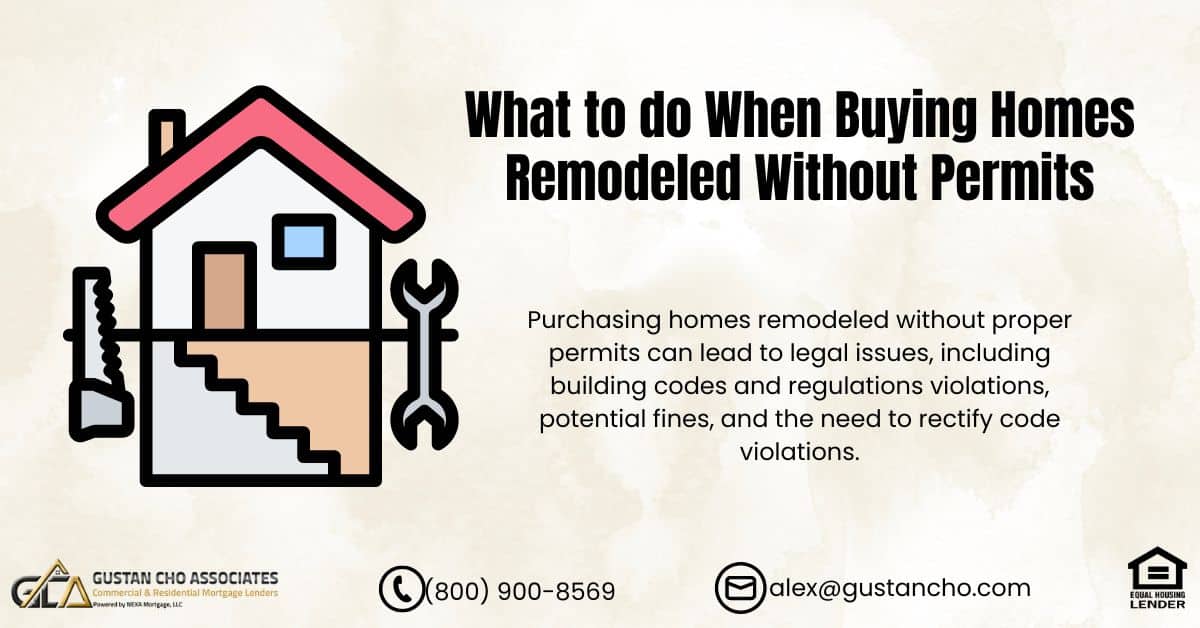
Tina
RealtorForum Replies Created
-
What Are Building Permits for Renovations?
Building permits are official approvals issued by local government authorities allowing you to carry out specific construction, renovation, or remodeling work on your property. They ensure that the work meets safety and building code standards.
When Are Building Permits Required?
Building permits are generally required for renovations or additions that affect the structure, safety, or utility systems of your home. Here are some common scenarios where you might need a permit:
- Structural Changes: Removing or adding walls, changing the layout, adding floors or rooms.
- Electrical Work: Installing new electrical systems, rewiring, adding circuits, or upgrading electrical panels.
- Plumbing: Moving or installing new plumbing fixtures, changing pipes, or modifying sewer lines.
- HVAC Systems: Installing new HVAC systems, ductwork, or modifying existing ones.
- Additions: Building new structures like garages, sheds, or decks, or expanding existing structures.
- Windows & Doors: Adding new windows/doors or changing their sizes.
- Roofing: Major roofing projects beyond simple repairs.
Why Are Building Permits Required?
- Safety: Permits ensure that construction work is done safely and meets local building codes, reducing the risk of future hazards.
- Code Compliance: They enforce compliance with electrical, plumbing, and structural codes, helping to prevent substandard work.
- Legal Protection: Permits provide legal documentation that your work is inspected and compliant, which can protect you in case of future disputes or insurance claims.
- Resale Value: Work done without permits might complicate property sales and lead to fines or demands for compliance when selling.
Do Building Permits Increase Property Taxes?
Renovations can lead to an increase in property taxes, but the direct impact of building permits on taxes depends on the scope of the renovation and local assessment rules. Here’s how:
- Assessment: Major renovations that add square footage or significantly improve the home’s condition could increase the property’s assessed value.
- Appraisals: Some jurisdictions conduct reassessments after permitted renovations, potentially increasing property taxes based on the new valuation.
- Documentation: Permit applications provide documentation of improvements that can be used for reassessment.
Obtaining permits is essential for ensuring that renovations are up to code and done safely. While the process may add time and cost upfront, it can prevent more significant issues in the long run. Depending on the scope of your project, it’s wise to consult your local building department to clarify which renovations require permits and to understand how they might affect your taxes.
https://gustancho.com/buying-homes-remodeled-without-permits/
gustancho.com
What to do When Buying Homes Remodeled Without Permits
Buying homes remodeled without permits need to be disclosed by the seller. There are many reasons why homeowners do not get proper permits
-
Tina
MemberMay 12, 2024 at 4:50 pm in reply to: Does Anyone Know If There Are Any States Where Permits Are Not Required on ADUsIn the United States, almost all states require some form of permitting for building accessory dwelling units (ADUs). There are no states that categorically do not require permits for the construction of ADUs, as building and safety regulations are critical to ensuring the structures are safe and compliant with local codes.
However, the ease of obtaining a permit and the specific requirements can vary widely from state to state and even within different municipalities within a state. Here’s how it typically works:
State Legislation and Local Control:
- State Laws: Some states have passed legislation to make it easier to build ADUs in response to housing shortages. For example, California has enacted laws to streamline the ADU permitting process across all its cities and counties.
- Local Jurisdictions: Despite state laws, local governments (cities and counties) often have the authority to set specific zoning requirements, building codes, and permitting processes. This means the ease of obtaining a permit can vary significantly even within a single state.
Streamlined Processes:
- Some states and municipalities are actively working to streamline the process for ADU permits to encourage more homeowners to build these units. This can include reduced fees, pre-approved plans, or by-right approval processes that minimize bureaucratic delays.
General Permit Requirements:
- Building Permits: Required to ensure the ADU meets state and local building codes.
- Zoning Permits: Ensure the ADU complies with local land use and zoning regulations.
- Other Specific Permits: Depending on the location, you might also need electrical, plumbing, or mechanical permits.
Recommendations:
- Check Local Regulations: Always check with your local city or county building department for the most accurate and up-to-date information on ADU regulations and permit requirements in your area.
- Consider State Laws: Be aware of state laws that may impact ADU development. States like Oregon, Washington, and California have specific laws intended to promote ADU construction.
- Consult Professionals: Consider consulting with a local architect, builder, or land use attorney who can provide guidance tailored to your specific situation and location.
While there is no blanket exemption from permits for ADUs in any state, the process and complexity of obtaining those permits can vary significantly. The trend in many states is towards making it easier to build ADUs as a way to address housing shortages, but compliance with local regulations is always necessary.
-
Tina
MemberMay 12, 2024 at 4:44 pm in reply to: Do I Need a Permit to Build a ADU or Tiny Home on my Property in IllinoisIn most cases counties in Illinois do require building permits to construct an in-law suite or accessory dwelling unit (ADU) on your property. Here are some key points about ADU/in-law suite permitting requirements in Illinois counties:
County Jurisdiction: Regulation of ADUs typically falls under county jurisdiction outside of incorporated municipal areas. Counties set their own permit rules.
Permits Required: The vast majority of Illinois counties require permits for the construction of any new dwelling unit, including attached or detached ADUs/in-law suites.
Zoning Compliance: Even if state law allows ADUs, counties review permit applications to ensure the proposed unit meets local zoning regulations like setbacks, lot coverage, unit size, etc.
Building Codes: Permits allow the county to inspect the ADU construction for compliance with applicable building and fire codes.
Utility Connections: Separate utility connections for the ADU often require permitting as well.
Minimal Exemptions: While a few counties may allow very small ADUs under a certain square footage to be built permit-free, these exemptions are quite limited.
Some examples of Illinois counties clearly requiring ADU/in-law suite permits include Cook, DuPage, Lake, Kane, Will and McHenry Counties surrounding Chicago. But the permit process details can vary somewhat by county.
Attempting to construct an ADU without proper county permitting can result in fines, stop work orders, or even having to remove the unpermitted construction. So it is highly advisable to go through the required county permitting channels for any new in-law suite or ADU in Illinois. A few minor exceptions aside, permits are generally mandatory.
-
This reply was modified 1 year ago by
 Tina.
Tina.
-
This reply was modified 1 year ago by
 Sapna Sharma.
Sapna Sharma.
-
This reply was modified 1 year ago by
-
Tina
MemberMay 12, 2024 at 4:40 pm in reply to: Do I Need a Permit to Build a ADU or Tiny Home on my Property in FloridaIn Florida, whether you need a building permit for a tiny house or accessory dwelling unit (ADU) depends on the specific size and construction details, but generally permits are required in most cases. Here are some key points about tiny house/ADU permits in Florida:
Size Exemptions:
Florida has exempted ADUs under 1,000 sq ft from permit requirements statewide if they meet the state’s building code requirements.
However, most tiny houses are smaller than 1,000 sq ft, so this exemption often does not apply to them.
Local Regulations:
While the state allows the 1,000 sq ft exemption, local jurisdictions (cities/counties) can have stricter rules requiring permits for even smaller ADUs or tiny houses.
Many localities do still require permits for any detached residential unit, regardless of size.
Zoning and Placement:
Even if the tiny house itself is exempt from permitting, permits are usually required for proper zoning approval, utility connections, and site preparation.
The placement and permanence of the unit also matters for permitting.
Permanent Foundations:
Tiny houses on permanent foundations are treated more like traditional housing requiring full permitting.
Those on trailer hitches may qualify as recreational vehicles with different regulations.
While Florida’s ADU law provides a permit exemption possibility, the vast majority of tiny houses and ADUs in the state still require permits from the local city or county due to their small size and zoning considerations. Checking your local rules is essential before proceeding with any unpermitted construction.
-
This reply was modified 1 year ago by
 Tina.
Tina.
-
This reply was modified 1 year ago by
 Sapna Sharma.
Sapna Sharma.
-
This reply was modified 1 year ago by
-
Tina
MemberApril 24, 2024 at 3:35 pm in reply to: Can Seller Concessions Be Used For a Down Payment on Home PurchaseIf you can get the maximum seller concessions from the home seller towards homebuyers closing costs you will not have any closing costs.
-
Tina
MemberApril 24, 2024 at 3:20 pm in reply to: Why Maintaining a Good Insurance Score is Crucial for Your Financial Well-BeingGreat tip, Brent. We all appreciate you.
-
Tina
MemberApril 24, 2024 at 3:18 pm in reply to: James O’Keefe Undercover with Gay White House AdvisorI truly believe James O’Keefe is the real deal and is a talented experienced undercover journalist who cannot be bought like others in the fake media like Jim Kramer, Janet Yellen, Joe Biden, Jerome Powell, Jessica Tarlov, Joe Scarlsboro, Adam Schiff, Mika Brzezinski, Nancy Pelosi, Nancy Pelosi, Chuck Schumer, Hillary Clinton, Merrick Garland, Bill Clinton, Barack Obama, Michelle Obama, Kamala Harris, and thousands of other liers. Kudos to James O’Keefe, the founder and President of OMG, O’Keefe Media Group.
-
Tina
MemberApril 5, 2024 at 3:02 pm in reply to: Former President Mat Grella Speaks Out of Departure from NEXA MortgageI agree with litigation every one loses except the lawyers. Here is an article on Mike Kortas, the CEO of NEXA Mortgage responding to the recently filed lawsuit from former partner Mat Grellaa
https://www.nationalmortgagenews.com/list/nexa-mortgage-ceo-talks-breakup-with-co-owner
nationalmortgagenews.com
NEXA Mortgage CEO talks breakup with co-owner, plans for the future
In the midst of a separation between Mike Kortas and Mat Grella, the company's CEO sets course to double headcount.
-
Florida insurance premiums are out of control.


